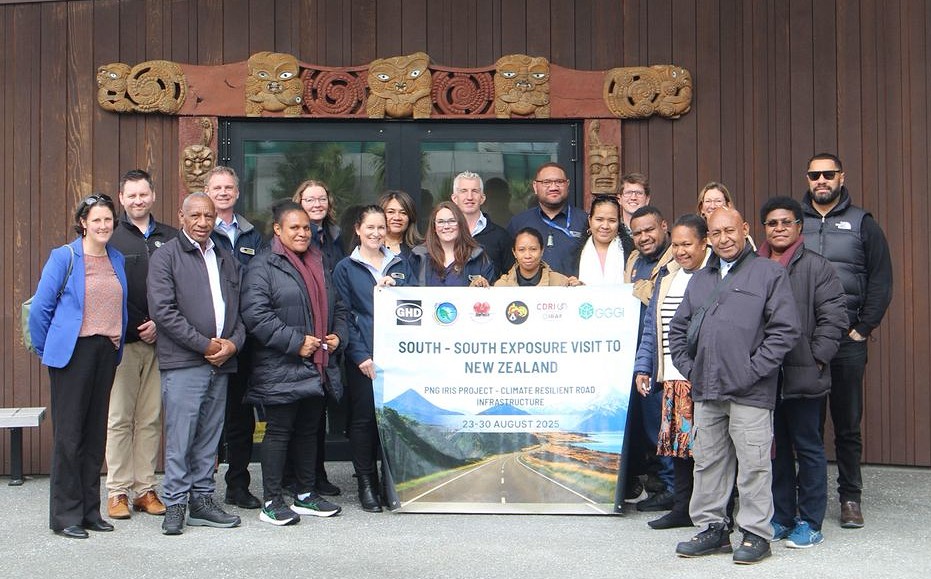The Department of Works and Highways (DoWH) and Climate Change and Development Authority (CCDA) are currently visiting Aotearoa New Zealand.
Their visit started last Saturday 23rd August and will end on Saturday 30th August 2025, and the purpose of the visit is to learn more about climate-resilient infrastructure.
The learning exchange programme comes as Papua New Guinea (PNG) prepares to mark 50 years of independence on 16 September 2025.
Improving road transport is a priority for Papua New Guinea’s economic growth and development, with limited road connections outside the main cities of Port Moresby and Lae.
Many of the country’s roads are exposed to climate-related hazards such as flooding, landslides, and sea-level rise, and in overall, PNG is ranked 89th out of 139 for infrastructure in the World Bank’s Logistics Performance Index.
This visit is part of the Infrastructure for Resilient Island States programme, a global initiative funded by the Coalition for Disaster Resilient Infrastructure.
The IRIS PNG programme is implemented by Global Green Growth Initiative and DoWH with support from GHD, a global professional services company.
During their visit to New Zealand, PNG officials will learn from NZ Transport Agency Waka Kotahi, councils, the National Emergency Management Agency and mana whenua about how climate risk and resilience are embedded in infrastructure planning and investment.
The delegation is set to visit Waikato region, including learning about the recovery from Cyclone Gabrielle to gather practical insights to help them implement PNG’s recently developed Climate Change Risk and Vulnerability Assessment Framework.
Kenneth Yamu, DoWH ESG Assistant Secretary says, “Our team comprised of DoWH, CCDA, TSSP and GGGI will be travelling to New Zealand for the South-South Exchange and Knowledge Exchange with town councils to visit climate resilient project sites to learn and integrate climate resilience into road infrastructure development in PNG.”
“We want to see the DoWH construct climate resilient infrastructure by 2030 that can withstand the extreme weather patterns; thus, this will require teamwork by improving knowledge and skills for our technical staff in DoWH to make collective and inclusive decisions that will benefit our people.”
Muhammad Ali Shaikh, Country Representative of GGGI PNG says “This exchange offers Papua New Guinea a valuable opportunity to learn directly from New Zealand’s experience in embedding climate resilience into infrastructure systems.”
“As we prepare to mark 50 years of independence, strengthening our road networks and transport systems against climate risks is not just a technical necessity but a foundation for sustainable economic growth and community well-being.”
Mr. Shaikh added that the lessons from New Zealand will help Papua New Guinea to apply it to PNG’s Climate Change, Risk and Vulnerability Assessment Framework in a way that is practical, inclusive, and scalable across Papua New Guinea.
Mr. Stephen Douglass, GHD Market Lead Environment and Communities for NZ Pacific also added that the learning exchange will present how New Zealand manages interconnected climate risks — a direct analogue for the challenges facing Papua New Guinea.
“It focuses on community development and sits within a wider programme to build capacity for climate-resilient, context-appropriate infrastructure prioritization, delivering lasting community benefits directly transferable to Papua New Guinea.”

